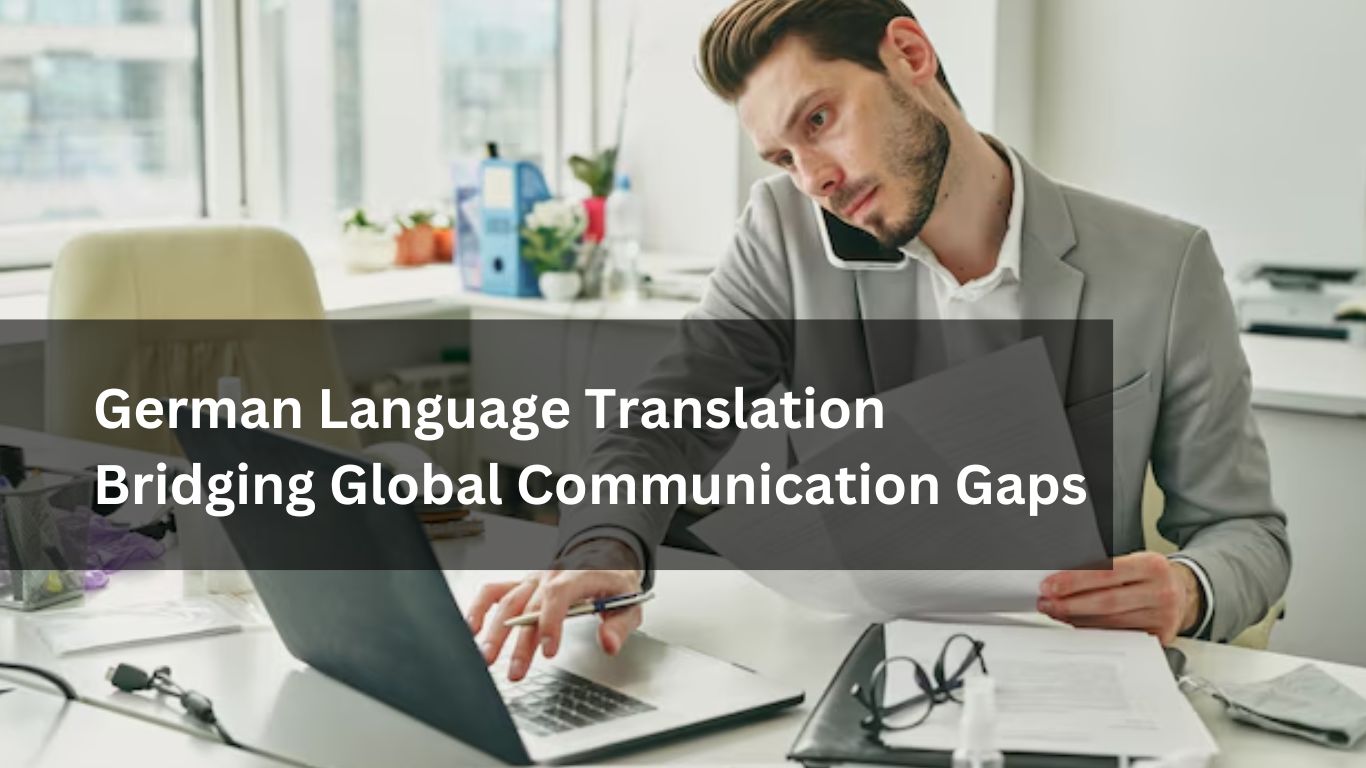Why German Translation Services Are Essential in Chennai?

Chennai, a dynamic and thriving city known for its cultural richness, technological advancements, and educational institutions, has seen a surge in collaborations with Germany. These collaborations span various industries, including trade, technology, education, and cultural exchange. As these ties deepen, the need for effective communication between Tamil, English, and German speakers has become more pronounced. Professional German translation services in Chennai play a crucial role in bridging this linguistic gap, enabling seamless communication and fostering successful partnerships.
German is one of the most widely spoken languages in Europe, with over 100 million native speakers. Whether for business ventures, academic pursuits, or personal exchanges, the demand for precise German translations in Chennai has grown significantly. Here’s a closer look at why these services are indispensable.
Key Reasons to Opt for German Language Translation
1. Business Growth Opportunities
As globalization accelerates, many Chennai-based businesses are eyeing opportunities in German-speaking countries. Germany, with its robust economy and status as a global leader in manufacturing, technology, and engineering, presents lucrative markets for Indian companies. However, succeeding in these markets requires clear and culturally nuanced communication.
Accurate translations of business contracts, marketing materials, technical manuals, and websites are vital to establishing trust and credibility. Professional German translators ensure that your content resonates with German clients and stakeholders, paving the way for successful collaborations and market expansion.
2. Academic and Research Excellence
Germany is renowned for its prestigious universities and cutting-edge research facilities. Every year, a significant number of students and scholars from Chennai apply for higher education and research opportunities in Germany. These individuals often require translations of academic documents such as transcripts, certificates, research papers, and letters of recommendation.
Professional German translation services ensure that these documents meet international standards, preserving their authenticity and accuracy. By providing certified translations, they help students and researchers navigate the admission process seamlessly.
3. Legal and Immigration Requirements
Whether applying for a visa, work permit, or permanent residency, individuals must submit legally accurate translations of essential documents. These may include birth certificates, marriage certificates, property deeds, and affidavits. Even minor errors in translation can lead to delays or rejections.
Certified German translators in Chennai specialize in legal and immigration-related translations, ensuring compliance with the strict requirements of German authorities. Their expertise helps individuals and families complete their applications efficiently and without unnecessary complications.
4. Cultural and Personal Communication
Language is deeply tied to culture, and German is no exception. For individuals involved in personal correspondence, creative writing, or cultural projects, accurate translations are essential to preserving the intent and emotion of the original message.
Professional translators with a deep understanding of both German and Indian cultures can help bridge gaps, fostering meaningful connections and collaborations. Whether it’s translating a personal letter or localizing a creative piece for a German audience, their expertise ensures that the message resonates authentically.
Finding the Right German Translator in Chennai
Selecting the right translator is crucial to achieving accurate and effective translations. Here are some factors to consider when choosing a professional German translation service in Chennai:
1. Certification and Expertise
Ensure that the translator is certified and has extensive experience in handling diverse projects. A skilled translator must have a thorough understanding of both the source and target languages, as well as the cultural contexts in which they are used. This expertise ensures that translations are not only accurate but also culturally appropriate.
2. Specialization
Different industries have unique terminologies and requirements. Whether you need translations for legal, medical, technical, or creative purposes, it’s important to work with a translator who specializes in your domain. Specialized translators are familiar with the nuances of industry-specific language, ensuring precise and contextually relevant translations.
3. Reputation and Reviews
Look for translators or agencies with a proven track record of success. Client testimonials and reviews can provide valuable insights into the quality of their work and their ability to meet deadlines. Reputable translation services often have portfolios showcasing their expertise in various fields.
4. Timely Delivery
Time is often a critical factor in translation projects. Whether you’re working on a business proposal, visa application, or academic submission, delays can have significant consequences. Choose a service provider that values punctuality and delivers high-quality translations within the agreed timeframe.
5. Confidentiality
Many documents requiring translation contain sensitive or confidential information. It is essential to work with a translation service that prioritizes data security and implements strict confidentiality measures to protect your information.
Benefits of Professional German Translation Services

Engaging professional German translators in Chennai offers numerous advantages:
- Accuracy: Expert translators eliminate errors, ensuring that the original meaning of your message is preserved.
- Cultural Relevance: Professional translations are adapted to align with the cultural norms of the target audience, enhancing their impact.
- Efficiency: Skilled translators complete projects efficiently, saving you time and effort.
- Enhanced Credibility: High-quality translations boost your reputation and professionalism, especially in German-speaking markets.
Quadrate Translation Company: Your Trusted Partner
For those seeking reliable German translation services in Chennai, Quadrate Translation Company is the partner you can trust. With years of experience and a commitment to excellence, Quadrate offers a comprehensive range of translation services tailored to meet the unique needs of clients across industries.
Our Services Include:
- Document Translation: We handle legal, academic, business, and personal documents with precision and authenticity.
- Localization: Adapt your websites, software, and marketing materials to the German market, ensuring they resonate with local audiences.
- Interpretation: Our skilled interpreters facilitate seamless communication during conferences, meetings, and events.
- Certified Translations: We provide certified translations for official purposes, ensuring compliance with legal and institutional standards.
Why Choose Quadrate Translation Company?
- Commitment to Quality: We uphold the highest standards of accuracy and cultural sensitivity in every project.

- Affordable Pricing: Our services are competitively priced, making high-quality translations accessible to all.
- Client-Centric Approach: We work closely with clients to deliver personalized solutions that meet their specific needs.
- Expert Team: Our certified translators bring years of experience and specialized knowledge to every project.
- Confidentiality Assured: We prioritize the security and privacy of your documents.
Conclusion
As Chennai continues to strengthen its ties with Germany, the demand for accurate and professional German translation services is on the rise. Whether you’re a business looking to expand, a student pursuing academic opportunities, or an individual navigating legal requirements, choosing the right translation partner is key to achieving your goals.
At Quadrate Translation Company, we are dedicated to helping you overcome language barriers with exceptional translation services. Visit our website to learn more about how we can assist with your German translation needs. Let us help you communicate effectively and confidently in the global arena!

